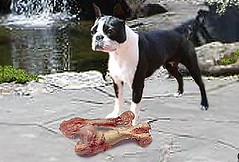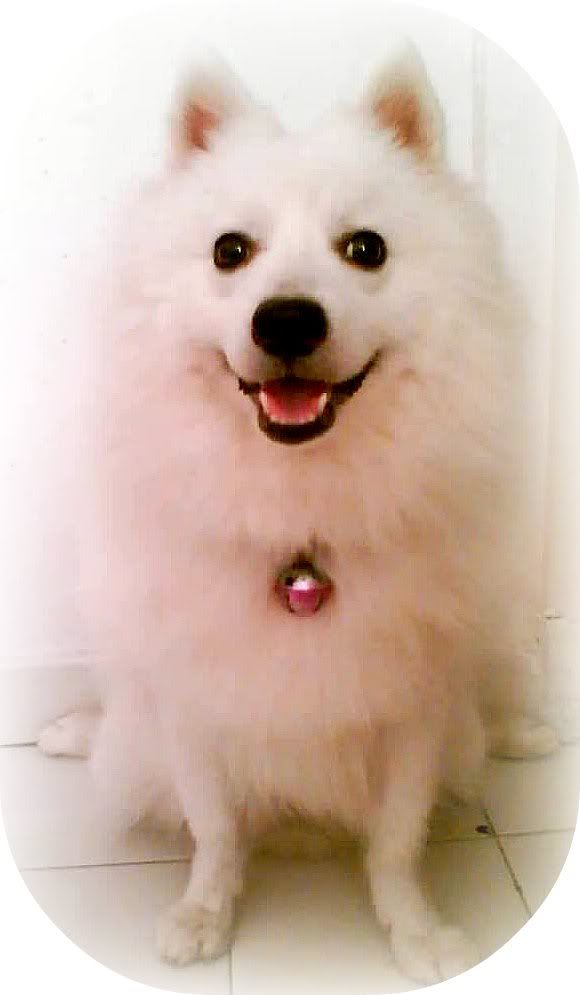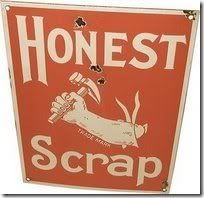Natural Doggie Dental Care

With all the uproar from one of our readers about oral hygine and dogs I wanted to share with you the natural way to keep your dog’s and cats’s teeth clean. NO commercial dental “TREATS” needed!
It’s time to get hip to what’s going on with the teeth and gums of the animal world. Periodontal disease in particular is quite common, especially in older pets, though it is not the only dental problem animals face. Dental disease is a combination of genetics and lack of education on the part of pet owners.
Pet owners are notorious for waiting to get into the habit of dental hygiene until they are midway through their pets’ time on this earth. Dental hygiene is a hard practice to break into late in the game; not only for owners, but for the pets, (especially cats). Dental hygiene should start at the very beginning of our pet’s lives, even when their teeth look as tiny as thorns.
Due to processed commercial foods (including grain based dry dog biscuits), our dog population lately is experiencing tartar build-up and subsequent periodontal disease as one of the number one health concerns today. Carbohydrate based dry dog food actually leads to an un-natural alkaline environment in the body. The carbohydrates in the food are broken down by enzymes in the saliva and form sugars, which in turn, cause increased tartar build-up.
Periodontal disease is the number one disease that affects our pets’ mouths after they turn two years of age. Yes, you read right, two years of age! Eighty-five percent of dogs two years of age and older have periodontal disease. It’s much more insidious than the other diseases because it affects more than just the teeth and soft tissue. It can destroy all of the supporting structures of the mouth. The infection can also seep into the bloodstream affecting other parts of the body (such as the heart and liver) and making a pet ill.
Doggie Breath?
Bad breath is one of the most obvious indicators that something is wrong. Unfortunately, most pet owners are used to bad doggy or kitty breath when, in fact, bad breath is simply not normal. In the earlier stages of periodontal disease, you may be able to reverse the damage with holistic/natural care and diet. A veterinarian can also intervene with a deep dental cleaning. But, because we’ve erroneously come to almost expect bad breath, the damage in our dogs mouth continues.
A healthy canine (or feline) mouth is teaming with bacteria; most of which are normal and natural. It is important to control plaque buildup on the teeth in order to ensure most of this bacteria are healthy bacteria.
Plaque is a mixture of bacteria, saliva components, and remnants of epithelial cells and white blood cells along with some broken down food particles. It is sticky and should be removed from the teeth daily. When not removed plaque becomes tartar (or calculus) as mineral deposits and organic material build up and harden on the teeth. Tartar generally looks like a yellow-brown layer on the teeth near the gum line.
As plaque and tartar build up on the teeth, the balance of healthy bacteria is then thrown off and the opportunity for disease is just waiting to take place. As the tartar builds up under the gums they become inflamed and sore. Slowly the gums begin to separate from the teeth and recede. Plaque builds even more rapidly in the upper, softer part of the teeth and infection begins. In cats, cavities develop with even more opportunity for infection. (Dogs are less prone to cavities). The bacteria and toxins are then absorbed into the blood stream where they circulate and begin to build up in kidney, liver, and heart tissue. This is serious stuff folks! The toxins released can even affect brain tissue. The inflammatory process involved can also aggravate already deteriorating joints.
Warning Signs and Smoke Signals
Many oral diseases get out of hand due to our (humans) lack of knowledge on the subject. . Below is a chart of some warning signs for the different oral calamities so that you can treat your pet before its too late.
| Problem | Outside Symptom | A Closer Look |
| Broken Baby Teeth | Difficulty eating or holding objects, incessant drooling, weight loss | Bleeding, gum boils, discolored teeth |
| Periodontal Disease | Drops food, paws at its mouth, avoids having its face or head touched, bad breath, weight loss, more reluctant to chew on hard food, tooth loss, sneezing nose bleeds | Bleeding, red gums, abscesses in the gum and jaw bone, deep pockets of infection |
| Cat Cavities | Cat eagerly approaches food then walks away without eating, weigh loss as a result | Gum in certain areas is growing up and into the teeth; upon pressing down on the gum, the pained animal will chatter its teeth and the gum may bleed |
Doing Our Part
Oral diseases aren’t mysterious and quite simply come from neglect.
First and foremost, it’s important to check your pet’s mouth daily for signs of injury and improperly erupting teeth. Some pets enjoy having their mouths stroked. If not, slowly trrn it into a game of some sort to make it easier for yourself and for them to inspect their mouths or brush their teeth. Proper care doesn’t only entail being observant nor does it have to entail taking your pet to the vet at the slightest provocation, it means rolling up your sleeves and being active to help prevent problems in the first place.
Steps to prevention of periodontal disease:
Healthy Diet - You guessed it; a healthy diet is vital for dental health. The healthier the animal, the better the immune system. A meat based diet (perferablly raw or home cooked and rare) is essential as meat helps maintain a healthier mouth environment. God desgend our carnivorous pets to eat raw meat with the bones. If you feed exclusively a commercial diet of kibble or canned food you are just asking for trouble. The dog at your feet (or on your sofa) has been bred down from the wolf, and its digestive system is virtually the same despite thousands of years of domestication. They have very short intestinal tracts geared to the consumption and digestion of raw foods.
Commercially prepared kibble has become the standard diet for most pets in our culture. It is relatively cheap and quite convenient. Knowledgeable pet owners and many veterinarians, however, are becoming increasingly aware of the true nutritional needs of our companion canines and are taking a pro-active approach to nutrition by choosing quality of ingredients over cost and convenience. For most dogs (and cats as well), a home-prepared raw food diet is best. I know that with some, this is not always feasible, however, as a Veterinary Naturopath, Natural Pet Care Educator and Nutrition Consultant, I do my best to offer the healthiest options available for all life-styles and feeding choices. Whatever you choose to feed your pet, I hope you will put some thought into your decision because, what you do NOW will produce big rewards over his or her lifetime and very probably help him/her avoid serious and costly illnesses caused by poor nutrition and feeding practices.
Dental Exercise – Chewing on natural, God designed hard food such as raw bones and giving treats such as tendons, or bully sticks helps exercise the teeth and gums and even helps scrape off plaque, helping to prevent tartar buildup. Many will at the very least, feed chicken necks to their dogs daily, for larger breed dogs you can feed turkey necks (Remember poultry bones do not splinter when raw.) You can also give them raw marrow bones or knuckle bones (many, also give thier dogs oxtails) for healthy chewing exercise.
When I was working in veterinary clinics, we would occasionally have a raw feeder such as myself bring thier dogs in for a check up. The vets were always so surprised to see that dogs that are given plenty of raw bones rarely if ever, needed a dental cleaning! They had to admit at the very least these dogs fed a raw meaty bone diet had something right going on.
If you are not willing to at least give your pets a raw meaty bone a few times a week to clean his/her teeth then you seriously need to begin to be proactive with either brushing daily or use a doggie mouth wash, drops and/or supplements.
I can hear some of you saying, “But what about hard, dry kibble and crunchy treats?”…. Crunching kibble and dog biscuits does not qualify as dental exercise nor does it remove plaque from the teeth; as mentioned above, eating kibble and biscuits generally produces dental problems as it leaves behind small bits of food material that easily stick to the teeth and contribute to plaque buildup. (Those commercials that showed the dog eating a bone-shaped biscuit followed by a big smile with sparkling white teeth were convincing but are purely fantasy).
Greenies and other commerial, so called “dental treats” such as Greenies are ever-popular are even falsely touted as being “Smart” as well other look a likes and edible treats . Just a couple words of caution: if your companion has allergies you may want to avoid greenies and the like as they are mostly wheat gluten and some even corn based. (Be sure to see my articles on why dogs should not be fed grains). Also, they can be high in calories, so not the best treats for overweight animals either.
*See below for an all natural dental treat alternative to greenies and the like.
Doggie Teeth Brushing – If you are not feeding a raw meat and bone diet or at least supplementing with a raw reactional marrow, knuckly bone or ox tails, it is imperative you brush yoiur dog’s teeth DAILY! Many refuse to brush our pets teeth even once a week. Please, stop and think a minute here, what would be the condition our mouths if we didn’t brush our teeth regularly? The same goes for our pets. The earlier you get into the practice of brushing, the better– Use a toothbrush designed for pets with very soft bristles to avoid damaging their delicate gum tissue. For toy breed dogs, the finger toothbrush is a great alternative. It’s a device that fits over your finger and is easy to navigate through your pet’s mouth. *IMPORTANT* – Refrain from using human toothpaste toothpaste, especially if it contains sweetners or baking soda, these can upset their stomachs and some cases, the sweetners can cause death.
Mouth Wash, Drops, Supplements - Mouth washes, drops, and diet or water supplements can be a great tool in the prevention of periodontal disease when combined with brushing. They are definitely not as effective as a raw meaty bone diet or brushing, but are certainly better than no home care at all.
Supplementing with Vitamin C
Vitamin C strengthens the immune system, facilitating the destruction of the germs and microorganisms that can enhance gum disease.
CoEnzyme Q10
CoQ10 is a potent antioxidant that can reduce inflammation in the gums, helps prevent free radicals from damaging healthy cells, supports healthy heart and immune function, neuroligical health, as well as promoting healthy gum tissue.
Echinacea
adding a few drops of Echinacea to the drinking water daily for two weeks to will help stimulate immune-cell function, slowing the progress of bacteriological invaders
Cranberries
researchers have proven that a beverage containing 25% cranberry juice inhibited bacteria from binding and accumulating on an artificial tooth by 67-85%.
Medical News Today, Nov. 9, 2004
Add 100% pure cranberry juice *NO sugar or artifical sweetners* (sweetend juice contains sugar that will only make matters worse) to the drinking water or you can put on a cotton ball and rub over the teeth and gums or in a syringe and drop on teeth and gums.
Wysong Dentatreat
Contains ingredients that help to maintain oral health that can be sprinkled directly onto food or used with a toothbrush as a tooth cleaning powder. Dentatreat is made entirely of safe, natural food ingredients and has no artificial colorings or flavorings. It helps to prevent tooth decay and gingivitis, remineralizes teeth, and discourages growth of bacteria that cause plaque.
For those of you who feel you must give your dog a Greenie or other edible chew in spite of all I have written here, let me please make mention of a few treats that are 100% natrural and digestable that would be a great alternative:
Porkhide Bones
they are made of 100% pork skin









































 Glitterfy.com - Glitter Graphics
Glitterfy.com - Glitter Graphics
No comments:
Post a Comment